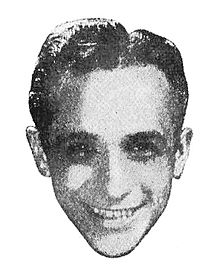This article has multiple issues. Please help improve it or discuss these issues on the talk page. (Learn how and when to remove these messages)
|
Sunny Skylar | |
|---|---|
 Sunny Skylar in a 1944 advertisement | |
| Background information | |
| Birth name | Selig Sidney Shaftel |
| Also known as | Sonny Schuyler, Sonny Skyler |
| Born | October 11, 1913 New York City, US |
| Died | February 2, 2009 (aged 95) Las Vegas, Nevada, US |
| Genres | Jazz, Big Band, Tin Pan Alley |
| Occupation(s) | Music composer, lyricist, singer, publisher |
| Instrument(s) | Vocals, Piano |
| Labels | Decca Records, Capitol Records, Mercury Records, Bluebird Records, Columbia Records, RCA Victor Records, MGM Records, Universal Music Group, Warner Brother Records, Atlantic Records, Apple Records, Polydor Records, EMI Records, Sony Classical Records, CBS Record Group[1] |
| Formerly of | Vincent Lopez, Abe Lyman, Paul Whiteman, Ben Bernie, Jack Denny, Freddie Perren, George Hall, Henry (Hank) Sylvern, Henry King, CBS House Orchestra, Ben Marden, Carl Hoff |
Sunny Skylar (October 11, 1913 – February 2, 2009) was an American music composer, singer, lyricist, and music publisher,[2] often recognized as one the most prominent songwriters of the Tin Pan Alley era. Sunny Skylar had written over 300 songs according to ASCAP,[3] and was inducted into the Songwriter's Hall of Fame in 2010.[4]
His compositions have been performed and recorded by countless timeless acts such as Frank Sinatra, Dean Martin, Ella Fitzgerald, Nat King Cole, The Beatles, Tony Bennett, Louis Armstrong, Bing Crosby, and Benny Goodman. He may be best remembered for adapting English lyrics to popular songs like "Bésame Mucho" and "Amor", as well as his original compositions such as "Don't Wait Too Long", "Gotta Be This or That", "Waitin' For The Train to Come In", "You're Breaking My Heart", "Hair of Gold, Eyes of Blue", "A Little Bit South of North Carolina", and many more. Included in the Great American Songbook and The Real Book, many of Sunny Skylar's songs have remained jazz standards.[5]
- ^ "Songs written by Sunny Skylar | SecondHandSongs". secondhandsongs.com. Retrieved April 1, 2024.
- ^ "Sunny Skylar Songs, Albums, Reviews, Bio & More". AllMusic. Retrieved April 17, 2024.
- ^ "Sunny Skylar". Ascap.com. Retrieved April 17, 2024.
- ^ "Sunny Skylar | Songwriters Hall of Fame". Songhall.org. Retrieved April 1, 2024.
- ^ "Sunny Skylar - MusicBrainz". Musicbrainz.org. Retrieved April 1, 2024.